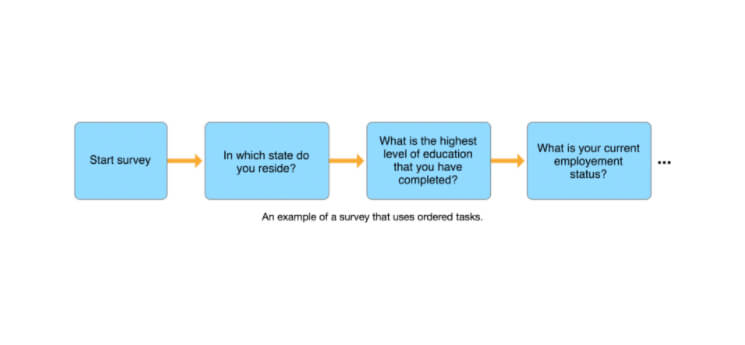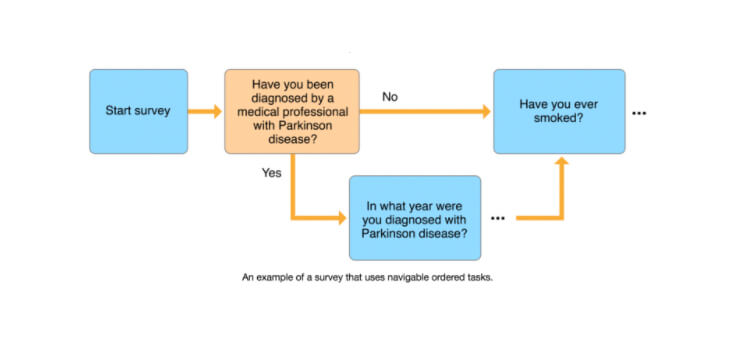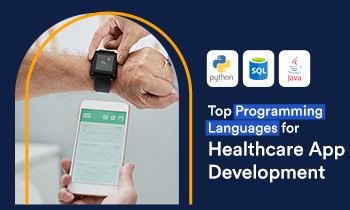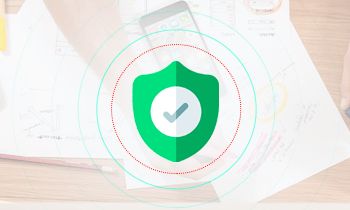The Apple HealthKit platform created a platform for users to have a single source for the personalized health information obtained from sensors and collected through a plethora of apps. Taking it one step further, Apple launched ResearchKit to open up this treasure trove to the researchers of the world.

Problem Of Scaling In Clinical Trials
The clinical trials would ideally have as many participants as possible for better statistical results. Diverse and larger groups would be able to give more insight into the effects of the trials.
However, the clinical trials get a limited response and they are difficult to handle due to the following reasons:
- Stricter Rules: Most of the trials need to go through the Institutional Review Board (IRB). The IRB has stricter rules for approvals and imposes restrictions on the information that can be accessed, the ways in which it can be accessed, who can access it, and how a person can join a trial.
- Informed Consent With Individual Interviews: Clinical trials need informed consent. Typically, it means that the researcher has to go through a session with every individual of a trial to explain the objectives of the trial, information required during the trial period, and methods of data collection. This puts a physical limitation on how many participants can be involved in a study due to the humongous amount of time spent on these administration activities.
- Individuals Responsiveness: If a trial needs the subjects to take the blood pressure every day, what can you do to make sure that it happens? How do you make sure that the pills are taken? Is exercise done? How do we make it easy the participant to do these activities? The existing systems lack a framework which will help the participant in all these tasks. Current studies highly depend on the motivation and enthusiasm of participants but can do very little to boost the same during the course of the trials.
ResearchKit Advantage

The ResearchKit makes serious efforts to solve all these problems. Apple probably also knows that the same framework can be useful for other operating systems as well, and hence the platform is made open source. That has allowed a compatible Android platform research stack to be created by the developers from Android community.
ResearchKit provides a standard solution to the requirements of clinical trials, such as:
- Informed Consent: The ResearchKit framework gives various options through which researchers can explain the trials with videos, images and text document. It also allows the developers to integrate the libraries for verifiable digital signature or PDFs to attest to identify the participant and the date & time of attestation.
- Reusable Surveys: ResearchKit provides the library containing the modules for easily creating surveys. The survey questions can be answered in more than 15 answer formats making it perfect for reducing the development time. The surveys can also include tasks whose results are gathered as survey answers.
- Activity: Apple has integrated ResearchKit to capture 11 activities through the device. This helps in assessment of physical activity performed by the participant as part of the trial. The key difference here is the measurable result provided with no extra hardware. These activities fall into various categories such as fitness, cognition, voice, audio, and others. The app developers can use these activities along with the CareKit to come up with a plan to track the effect of the medication on the participant. The results of these activities can be seen through charts to understand the impact of medication.
- Charts: ReserchKit framework includes 5 types of charts, Pie chart, Line graph, Multiple Line graph, Discrete graph, and Discrete graph with multiple points.
Informed Consent
Clinical trials need informed consent from the participants to use their information for the study. The consent may be necessary for the research study, or to share the data of the study with other researchers. The IRB or Ethics committee might make it mandatory to obtain the consent from the users.
Informed consent can be broken into two parts: providing information in an understandable format and obtaining consent.
Types of screens offered in informed consent:
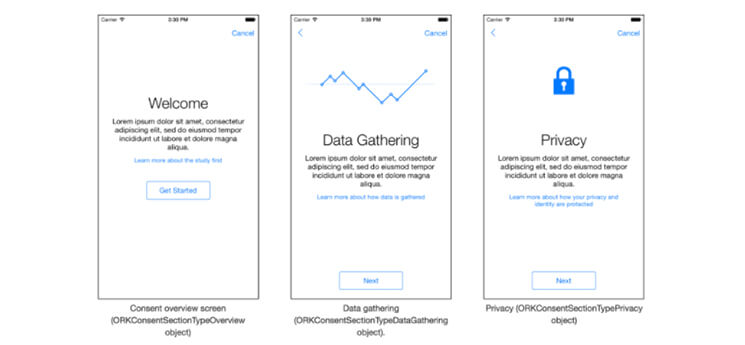
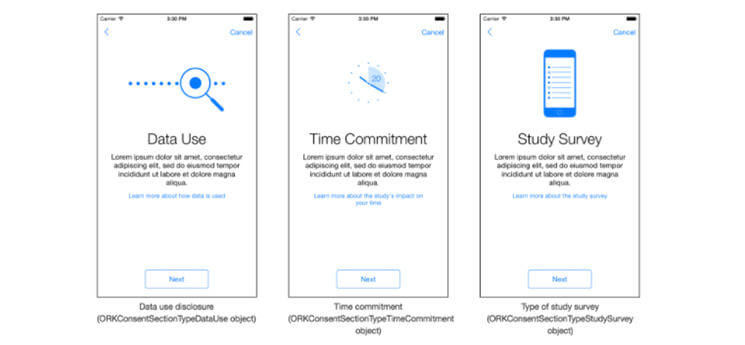
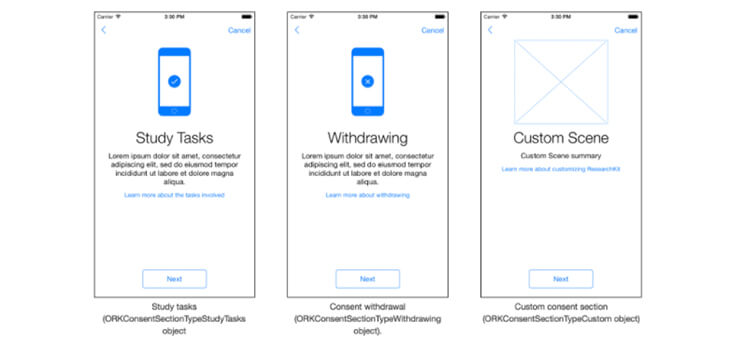
The information can be presented in the document or in visual formats through animated sequences. This is known as visual consent step. We need to add a document to consent review step if we want to obtain the signature on it. However, the conversion of signature in verifiable format needs to be performed through external utilities.
Surveys
Surveys are list of questions for users to provide the feedback. The sequence of questions and the decision tree for the sequence is broken into steps. We can get results of each step or we can get the result of entire task. There are two types of tasks:
- Ordered Tasks: User has to follow a order of the steps in these tasks. Some of the questions can be optional or mandatory based on the requirement.

- Navigable Ordered Tasks: In these tasks, the decision tree of questions can be formed to navigate through the list of questions. This enables us to take the steps based on the answers provided by the user.

Survey Answer Formats:
survey questions can accept answers in multiple formats. The answer formats accepted are as follows:
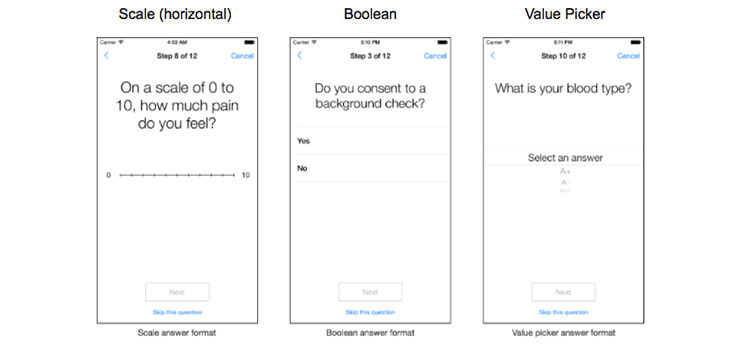
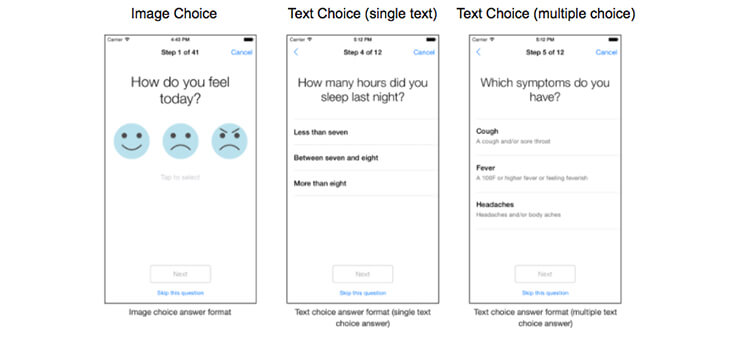
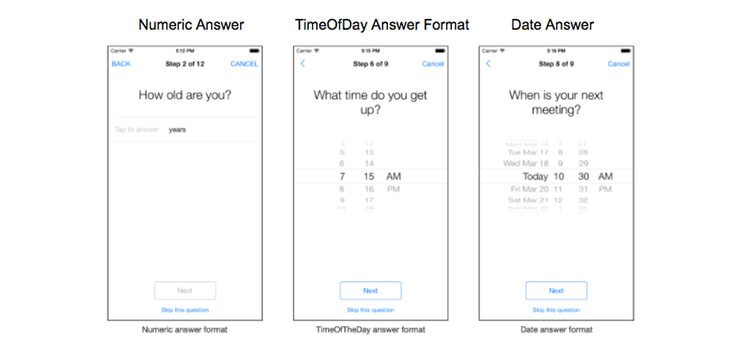
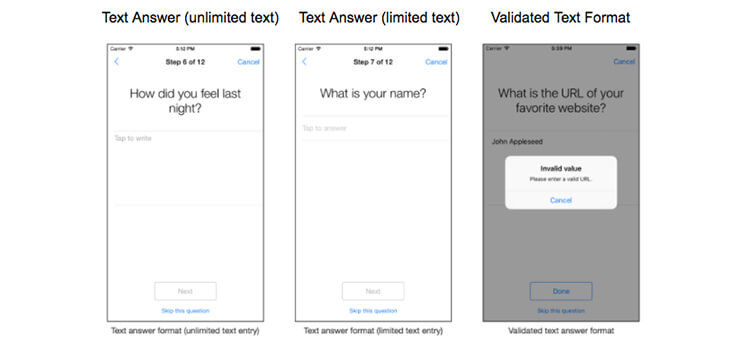
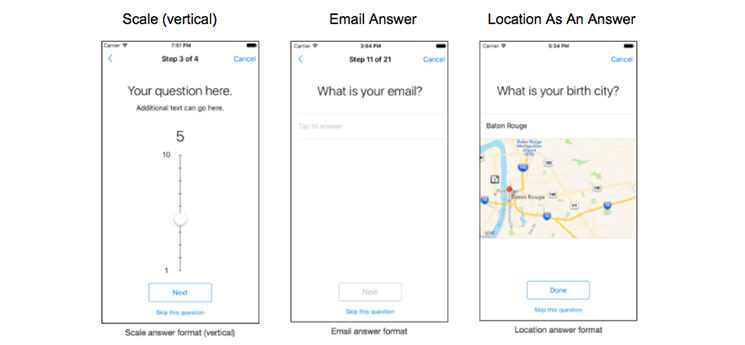
In addition to these formats, we can also use HealthKit data in the answers.
Activity
The ResearchKit framework contains some predefined tasks which we can use in our applications.
These tasks are categorized into motor activities, fitness, cognition, voice, audio, and hole peg.
Motor Activities:
These type of tasks measure the motor activity of the participant based on the interactions and activities performed by the user. There are two types of tasks assigned to this category:
- Gait and balance – Find the balance of the person based on device pedometer
- Tapping speed
Fitness:
Fitness related activities measure the device motion, step count, heart rate along with the location to come up with fitness details such as the speed of the walk, distance travel, and heart rate changes.
Cognition:
These type of activities are primarily based on interaction with the phone screen. These activities test the spatial memory and reaction time. There are other activities in this category which ask users to solve problems such as Tower of Hanoi and Serial addition to check the problem-solving abilities.
Voice:
Voice activities test the user’s ability of sustained phonation.
Audio:
Audio activities test the minimum amplitude for the user to recognize the sound.
Hole Peg:
Hole peg activity tests the hand dexterity by verifying the completion time and distance moved on the screen in the specified directions. This activity can use multi-touch display tasks to determine the result.
Charts And Graphs
The ResearchKit framework provides inbuilt charts and graphs. These charts are useful for visualizing the results of the activities. The types of charts supported by ResearchKit are:
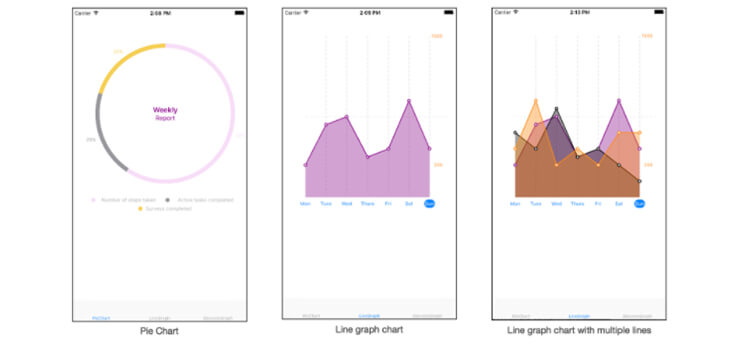
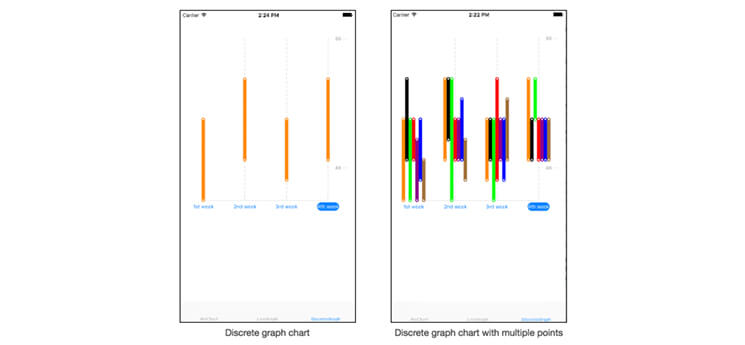
Scaling The ResearchKit App
In simple applications, the tasks and surveys are defined only once during the development of the application. However, this approach has limitations over version control and scaling the application to include complex scenarios. For a large scale deployment, we store the surveys and tasks on the server and download them for as and when necessary for creating the tasks on the phone.
Author’s Bio

Hemant Shinde works as a Solutions Engineer at Mobisoft Infotech. He likes to add scalability and availability to mobile applications. He has 9+ years of experience in systems engineering, virtualization and cloud based systems. Apart from that, he has interest in history, e-commerce, Internet of Things and loves traveling.
